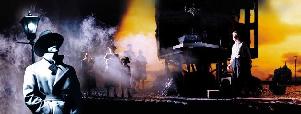 London Review
London Review
An Inspector Calls
by Lizzie Loveridge
|
But after all it is better to ask for the earth than to take it.
--- Inspector Goole |
 An Inspector Calls
|
A well to do, middle class family, the Birlings of (fictional) Brunley are celebrating the engagement in 1912 of their daughter, Sheila (Emma Gregory) to Gerald Croft (Owen Oakeshott), local landowner, a dynastic marriage in terms of the prosperous business classes of the north of England. Mr Birling (Edward Peel) owns a local factory and hopes for a knighthood, the ultimate accolade for the aspiring. His wife Mrs Birling (Diane Fletcher) already acts the grande dame; you know the sort, all the pretension with none of the responsibility or gentility. The Birlings' son Eric (Andrew Leonard) is a wastrel and a drunkard. Into this family gathering arrives the mysterious inspector (Niall Buggy) who has come to investigate the death of a destitute girl who has committed suicide by swallowing disinfectant. Slowly the inspector reveals the part that each member of the gathering has playing in the girl's descent. To say any more at this stage would be to spoil Priestley's thriller.
Daldry's production opens before the curtain is up with an old red telephone box at an angle in one of the low boxes, the floorboards curled up after an explosion. A young boy in short trousers helps raise the curtain to reveal a substantial Edwardian house perched about the detritus of a bomb site against a backdrop of a fiercely clouded sky. From the house come the braying sounds of the rich, middle class at play. Even before we have seen their faces we have made up our mind about these selfish, spoilt, arrogant people. Daldry's staging introduces at times working people from the 1940s to look on the scenes from the earlier era. Edna (Leila Hoffman) is the Birling's servant who remains outside the house as if in disassociation from the family. In a light touch, a red patterned carpet is rolled out for Mrs Birling to descend from the house to talk to the inspector. Stephen Warbeck's very dramatic film type music adds to the atmosphere as does the smog and clouds rolling by with lighting effects.
Ian MacNeil's set is ground breaking, literally, with its bomb site -- and there are more surprises to come. The Edwardian house opens only after the characters have looked out from the windows. The people are oversize in relation to the house like something out of Alice in Wonderland and in the distance we can see a model house and lamp post, tiny replicas as if distancing us spatially, a physical manifestation of the decades separating us from the action. The house swings open to reveal a dining room but the characters emerge to be interviewed by the detective who stands enigmatically under the lamp post in his mackintosh and fedora. Together set designer and director have created surreal effects.
I have now seen this production of An Inspector Calls three times and each cast brought different emphasis to the roles. Emma Gregory's Sheila Birling and to some extent, her brother Eric (Andrew Leonard), represent youth and the hope for the future that the next generation will have more of a social conscience as the two younger people make a journey from selfishness to social awareness. Diane Fletcher's Mrs Birling is monstrous without going completely over the top into a pantomime type figure. Niall Buggy's Inspector Goole has many of Priestley's best lines which Buggy delivers beautifully, softly spoken for the most part but insistent as he seeks to uncover the truth. Some of the 1912 play is almost melodrama, but that too reflects the style of the period.
This play deserves its long running place in London's West End as a straight play that can be enjoyed by people from age twelve or so to ninety-nine. It is a stroke of early directorial genius from Stephen Daldry, the director of the film Billy Eliot.
| An Inspector Calls
Written by JB Priestley Directed by Stephen Daldry With: Niall Buggy, Diane Fletcher, Edward Peel, Owen Oakeshott, Andrew Leonard, Emma Gregory, Leila Hoffman Design: Ian MacNeil Lighting Design: Rick Fisher Sound: Rod Mead Music: Stephen Warbeck Running time: One hour fifty minutes without an interval Playhouse Theatre, Northumberland Avenue, London WC2 5DE Box Office: 020 7839 4401 Booking to 31st March 2002 Reviewed by Lizzie Loveridge based on the 27th September 2001 performance |


